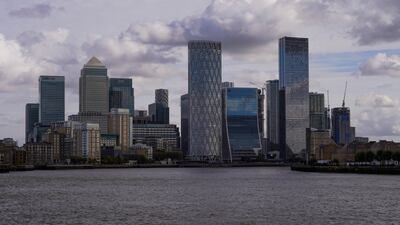UK banks have warned against a reported multibillion-pound tax raid on sector profits which is reportedly being planned by new Chancellor of the Exchequer Jeremy Hunt.
Shares in Britain's biggest lenders fell on Wednesday in response to the rumoured levies, as industry executives said any tax rises would challenge competitiveness.
Shares in Lloyds Banking Group, the UK’s biggest lender, were down about 3.5 per cent, while fellow British lending giants NatWest and Barclays saw their shares slip by about 1.5 per cent.
Windfall taxes on the banking sector would be “ludicrous” and further deter international investment into the UK economy, according to analyst Michael Hewson of CMC Markets.
Mr Hunt is thought to be weighing up new tax measures in anticipation that high-street banks will report big profits for the year, the Financial Times reported.
Higher interest rates mean that lenders are raking in unusually high earnings from customers paying back more on their debt, yet find the prospect of redistributing the profits via taxation unpalatable.
Mr Hunt has said he is not opposed to windfall taxes as the country fights rampant inflation and the fallout from the now-discredited mini-budget that prompted markets into a selloff and the pound to slide.
The Office for Budget Responsibility had indicated that Mr Hunt is looking for up to £30 billion ($33.9bn) to show markets he can balance the budget and bring debt down.
Mr Hunt stepped into the finance job after Kwasi Kwarteng was fired for the mini-budget that caused markets to panic, hitting pension funds and forcing mortgage rates to rise.
He is now looking to develop a new budget to tackle the crises hitting Britain.
Mr Hunt has confirmed corporation tax will rise to 25 per cent next April but he appeared to be undecided on whether to keep the banking surcharge, currently at 8 per cent.
If he cuts the surcharge to 5 per cent, that means an effective rate of 30 per cent which could raise £500 million per year, according to Financial Times sources.
Banks warn taxes deter foreign investment
Mr Hewson criticised the potential “short-sighted” behaviour of the chancellor to impose heavier levies on banks when the economy is “crying out” for international investment.
“This comes across as incredibly short-sighted at a time when the government should be looking to encourage investment into the UK economy,“ he said.
"It is true that banks look set to make higher profits from the rise in interest rates as well as reserves from overnight deposits held overnight at the Bank of England, but they are also likely to have to make further provision for impairments as the UK economy deteriorates over the next 12 months.
"It seems ludicrous to double down on windfall taxes on a sector that dares to make too much in the way of profit. It is also an odd way to encourage longer term investment into the UK economy, which is crying out for inward investment.”
David Postings, chief executive of trade body UK Finance, urged the government “to not put at risk the competitiveness of the UK’s banking and finance industry”.
“Two thirds of those jobs are outside London. The industry pays a higher rate of taxation overall than any other sector because of the bank surcharge and the bank levy,” he said.
“The government’s decision to increase corporation tax, when it was originally planned, included a reduction in the surcharge levied on banks.”
The Treasury is due to announce what will happen to the bank surcharge when its medium-term fiscal plan is unveiled on October 31.
Ben Zaranko, from the Institute for Fiscal Studies, said Mr Hunt is likely to want “a combination of tax rises, savings on social security and squeezing public services a bit more to make the numbers add up”.
“The only one not already done is [value-added tax], so that would be an obvious place to look, but it would obviously add to the cost of living squeeze so might not be incredibly popular,” Mr Zaranko said.
Mr Hunt has warned of hard decisions coming as the budget approaches.
















